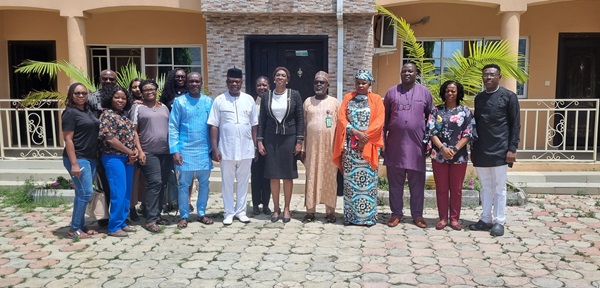
The director-general of the National Biosafety Management Agency (NBMA), Dr. Agnes Asagbra has described biosafety, often operating behind the scenes, as a cornerstone of Nigeria’s development agenda.
She made this assertion during a press briefing on June 4, 2025, in Abuja, where she marked her second anniversary in office and gave an account of her stewardship under President Bola Tinubu’s administration.
Reflecting on her tenure, Asagbra said her two years in office have been guided by a clear mission: to regulate the safe and responsible application of modern biotechnology in Nigeria, in ways that protect human health, conserve biodiversity, ensure biosecurity and support national goals on food security and sustainable development.
Among the agency’s key accomplishments, she highlighted the successful surveillance and tracking of genetically modified organisms (GMOs) in 32 supermarkets across the country. According to her, the operation was not a routine inspection but a coordinated national effort to ensure only approved GMO products are sold to the public, enforce proper labelling in line with international best practices, and strengthen consumer confidence in the nation’s food system.
Asagbra also pointed to the authorisation and monitoring of seven confined field trials (CFTs) for genetically modified crops, including cowpea varieties resistant to pod borer and storage bruchid pests, and gene-edited cassava aimed at increasing root yield. She said these trials are more than scientific procedures—they mark the foundation of an agricultural revolution in Nigeria rooted in science, safety and sustainability.
Another key milestone was the accreditation of three major institutions to carry out GMO research and experimentation. These include the National Institute of Horticultural Research (NIHORT), INQABA Biotech West Africa, and the Faculty of Biological Sciences at the University of Calabar. Asagbra described these institutions as part of Nigeria’s emerging biotech vanguard, capable of delivering solutions to local agricultural and health challenges within a framework that is both scientifically sound and ethically responsible.
She noted that nine facilities nationwide have also been certified to handle the food, feed and processing (FFP) of GMO materials. According to her, biosafety doesn’t end at the farm; it spans the entire value chain – from storage and processing to the dinner table. The certified facilities are now critical components of a national biosafety system that guarantees no cross-contamination, no unauthorised imports or processing, and full traceability from field to fork.
The NBMA also organised capacity-building workshops, training over 1,470 Nigerians in 2024 alone. Trainees included scientists, customs officers, academics, and private sector professionals, who received instruction in GMO detection, biosafety laboratory procedures, environmental risk assessment and regulatory compliance.
Asagbra emphasised the agency’s increasing role in biosecurity, noting that biotechnology’s scope extends beyond agriculture and food to encompass national security. In response, NBMA has taken on the additional mandate of ensuring biosecurity throughout the country.
To that end, the agency has formed key strategic partnerships with the Office of the National Security Adviser (ONSA) and INTERPOL. These collaborations have led to the establishment of the National Biosecurity Advisory Committee, the inauguration of the National Technical Working Group on Biosecurity and the rollout of a National Biosecurity Action Plan (2022–2026).
“These steps are crucial in ensuring that Nigeria is fully prepared to detect, prevent, and respond to biological threats – whether they stem from natural disease outbreaks, laboratory accidents, or acts of bioterrorism,” she said.
“In doing so, we are not just protecting our environment and biodiversity. We are safeguarding the lives of our people and reinforcing the sovereignty of our nation.”


